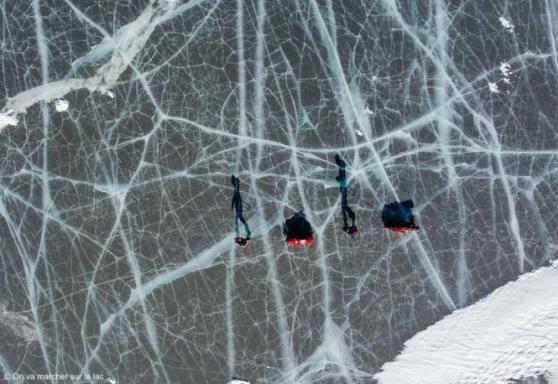Planet's nature travel business, decided to take on the polar environment. Passionate about nature and extreme sports, he set himself a goal: to cross Lake Baikal in winter on his own with his partner Aliénor. However, international geopolitics forced them to reconsider their project, and Renaud and Aliénor decided to concentrate on Mongolia and the round trip across frozen Lake Khövsgöl. They completed this expedition in February 2023. This great adventure gave rise to a Winter expedition on Lake Khovsgol in Mongolia, which we are planning for February 2024. In this article, we talk to him about this expedition, from its genesis to its completion. A fascinating interview about a particularly original and beautiful project.
Find out more about long polar crossings and traverses.
What motivated you to embark on this adventure?
My partner Aliénor and I decided at the start of our first confinement to embark on an adventure together. Both of us had traveled extensively before getting to know each other. Since we've been together, we've been out in the field several times, mainly on wildlife conservation projects. We've also done a lot of hiking and trekking in the mountains, and were keen to share a powerful experience. As we considered the various destinations that might appeal to us, we quickly settled on Lake Baikal. Sylvain Tesson's book Dans les forêts de Sibérie was undoubtedly a factor.
Neither of us had any long-term experience of cold environments, and we were immediately drawn to the idea. We liked the idea of discovery and immersion in a universe about which we knew little or nothing. Finally, we liked the idea of being on the lake. The idea of simply walking out into nature and living simply, without artifice. Not to confront this unfamiliar environment, but rather to learn from it, in order to make the best of it.
Find out more about Renaud's expedition on the On va marcher sur le lac blog.
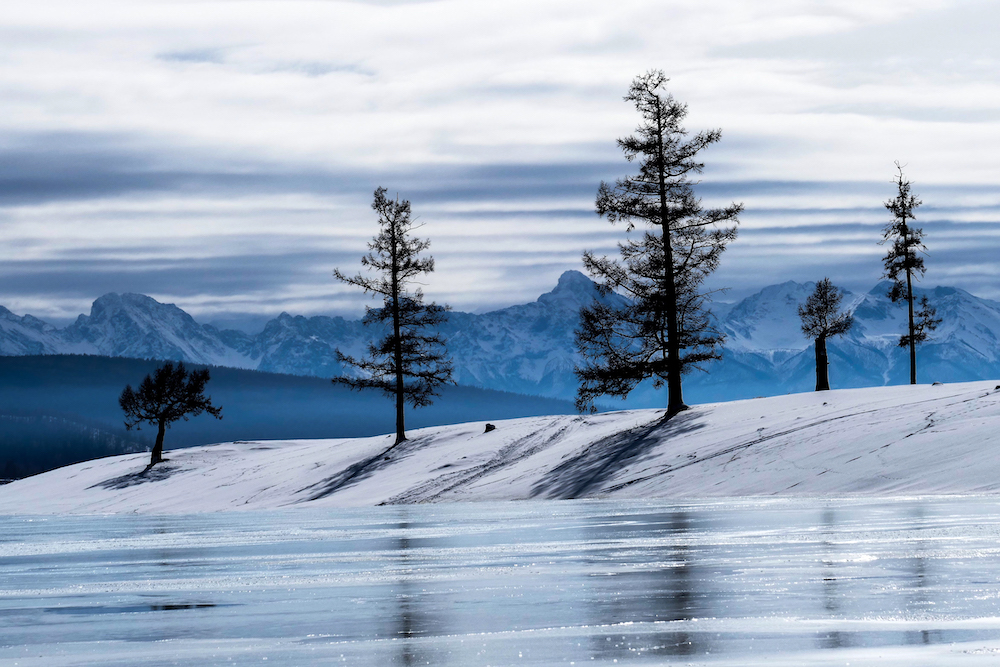
© Jacques Ducoin
Why Mongolia and Lake Khövsgöl? Was it your first time in Mongolia?
In February 2022, the outbreak of war in Ukraine led us to consider another destination. Going to Siberia was no longer an option, and we spent some time imagining other possible locations. We liked the idea of a frozen lake, and it was during a conversation with our friend, polar explorer Alban Michon, that the name Khövsgöl came up. Alban had been there, and spoke of it as a magnificent place. Neither Eleanor nor I had ever been to Mongolia, but the country held a kind of fascination for us. Its sparse population and vast natural landscape were bound to attract us. Incredibly rich landscapes and encounters with Mongolians, so beautifully recounted in Marc Alaux's books. Moreover, Lake Khövsgöl is separated from Baikal by only 200 kilometers, and its waters flow into Baikal via the River Eg. In the end, going to Mongolia rather than Russia appealed to us even more.
Is there any special preparation required for this kind of expedition?
Preparation depends on individual experience. If Aliénor and I are adept at trails, hikes and treks in the mountains, sometimes at altitudes of over 5,000 meters, then conscientiously preparing ourselves for a month or so of extreme cold seemed appropriate. We made the most of the time we had available. On two occasions, we met up with our friend Alban Michon at his explorers' school in Tignes. There, for example, we simulated a passage through the ice, and spent our first night in a tent on the ice. We also took part in Expeditions Unlimited's Polar Environment Preparation Course in Belgium, led by Dixie Dansercoer. Near Chamonix, we took part in a day-long introduction to mountain and polar medicine, also organized by Expeditions Unlimited in conjunction with Ifremmont.
It was a real plus to benefit from these experiences, as well as that of polar guide Manu Poudelet. We also did several mental preparation sessions with Simon Allaz. As a mental coach myself, I could not fail to appreciate the importance of this approach, particularly in view of the fact that we were embarking on this adventure as a couple, and that we needed to be well aligned with the reasons why we wanted to go. In this sense, the GR20 in Corsica in 11 days and the Ultra Trail de l'Ultra Marin in Morbihan enabled us to confront the difficulty together, and to adjust the fact of progressing as a couple.
Finally, we spent many hours meticulously selecting every piece of our equipment: our pulkas, our stove, our clothes, our sleeping bags, our tent, our communication tools, our food... We were lucky enough to have several partners on our side, including equipment manufacturer Ferrino, but also numerous donations from individuals who wanted, in their own way, to live the adventure alongside us. They followed us via our Facebook and Instagram pages, and also via our website.
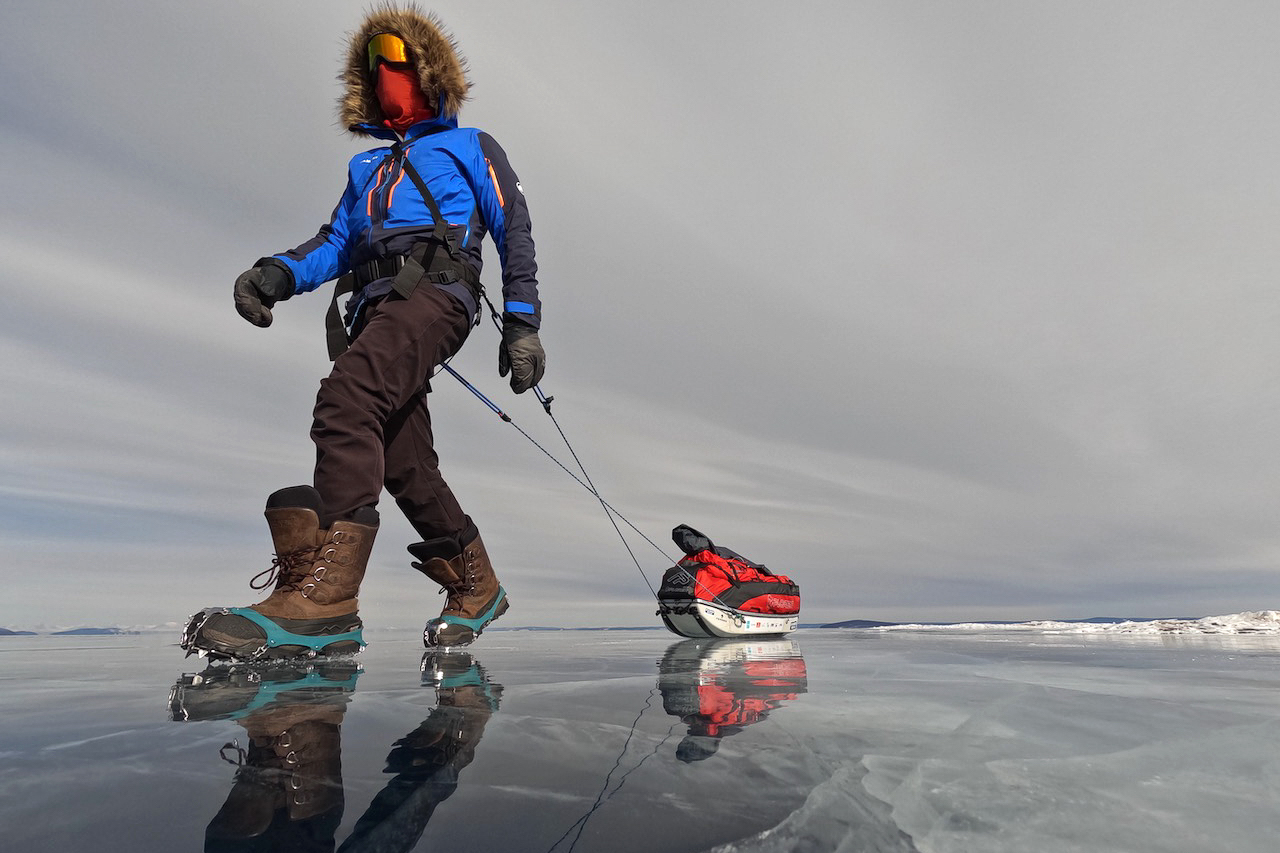
© On va marcher sur le lac
Was this your first expedition? How can you tell if you've got what it takes to embark on such an expedition?
I'd already completed several sporting adventures, on mountain bikes and on foot in the deserts of Australia, then swimming down the Loire and Maroni rivers in French Guiana. For Aliénor, it was a first. It took a while before we felt ready. Undoubtedly, testing in conditions close to those on the lake, such as the week we spent in winter on the Grande traversée du Jura, contributed to this. However, we always considered that, above all, we had to remain humble in the face of the experience that lay ahead. We knew our equipment well, and mastered most of the technical aspects, but in a largely theoretical way. In any case, we left feeling that we'd done what we needed to do to feel ready, and were looking forward to it.
What were your impressions and sensations on the ice?
It's one thing to imagine yourself on the ice at -35°C, and quite another to be there, taking your first steps while towing an 80-kilo pulka. The first few days were very intense, because we were finally there, and we could feel the ice crunching under our crampons and boots. The first thing that struck us was the cold that whipped the slightest bit of skin in the open air. Then there's the breathtaking beauty of the ice, its shapes and colors, and the feeling of being tiny. In the beginning, it felt like we were fighting against something. Against the cold of course, against our stove that wouldn't start, against the time to set up our camp in the best possible conditions. Then, after a few days, we found our feet.
We then began to make do with the lake, regarding it with ever-greater respect and admiration. We marveled at its sounds, the impressive cracking in the night as noisy bubbles burst around us, making us feel as if we were in a giant pot on the fire. We were walking on stretches of snow, or alternating snow and sharp ice. On several occasions, we had to skirt around areas of compression ridges. Square kilometers where the ice resembled a broken glass floor, making it difficult or impossible to progress, rather than the regularity of an ice rink.
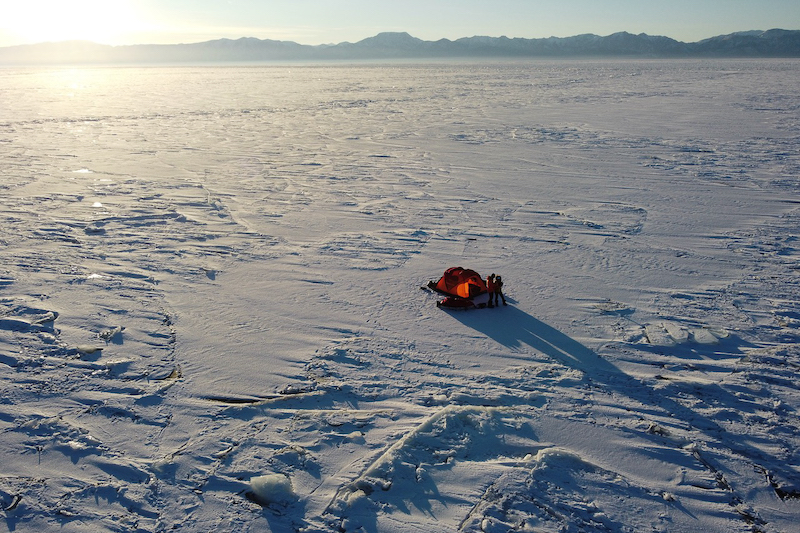
© On va marcher sur le lac
A regular day
When we woke up around 7:30 a.m., we always needed a little time to get out of the relative warmth of the comforter. I'd go out and brush our ice-covered pulkas, then remove the flysheet and hook it to the tent with a carabiner while Eleanor melted the ice for breakfast. It took me a while to warm up, especially my feet, despite the thick boots and thick socks. The amount of ice accumulated inside over the nights was impressive, and it took me a good half-hour to remove it with a brush. On two occasions, I tore the fabric with my crampons, which meant we had to start sewing. We also took time for a bit of grooming, especially Eleanor, who was much more assiduous than I was. It wasn't easy thawing out a frozen block of wipes by the stove. We only had a few seconds for a wash-up before the wipe became solid again.
After another freeze-dried meal, we set off at around 11 a.m., stopping every hour to drink tea and eat a few seeds, cheese and frozen sausages. We often skirted around large patches of snow, moving as often as possible over the ice, on which our pulkas glided like soap. Because of the ridges, we had to follow the car tracks for part of the outward journey. Around 4pm, we set up camp on the snow. It insulated us a little from the cold of the lake. Once our tent was up, we set up an insulating mat and our mattresses, then our comforters and pillows. We chose the freeze-dried dish we were going to eat, then went to get some ice. After breaking it in the hard lake, we quickly opted for the compression zones, which offered us directly accessible ice cubes. All we had to do was break them into small pieces to fit into our kettle. Melting them and filling our thermoses took a good hour before dinner. It didn't take us long to fall asleep, waking up often, especially in my case to satisfy a natural craving in the bottle kept in my sleeping bag. Every day, our friend Marie sent us a precise weather report with the forecast. This led us to spend a whole day in a tent after the halfway point, due to the very strong winds that were forecast.
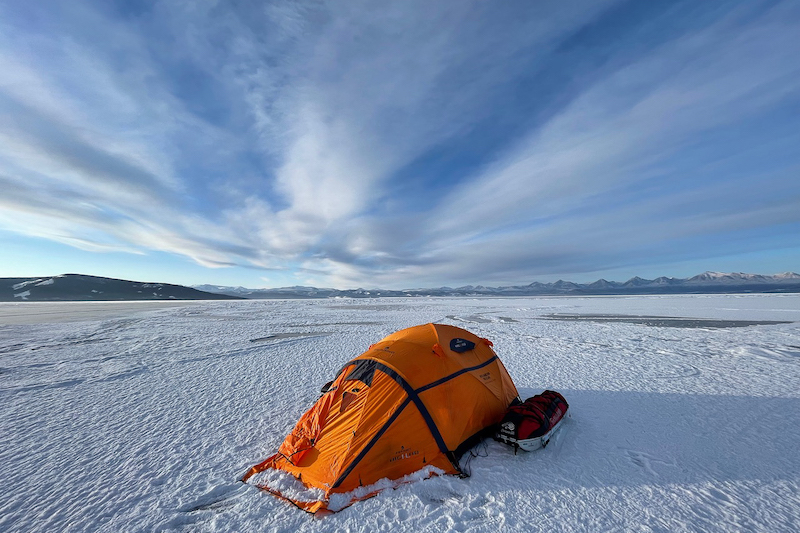
© On va marcher sur le lac
Why did you choose to do the round trip?
Initially, we had planned to cross Lake Baikal from north to south, along its 600+ kilometer length. The Khövsgöl is much smaller, measuring just 136 kilometers in length. So, making the round trip seemed the logical choice. Above all, we wanted to spend time on the lake, and by no means achieve a performance. So we liked to take our time, even slowing down on the last few days so as not to reach the village of Khatgal, from which we had set off, too early.
What was/are the most memorable moment(s) for you?
I never ceased to marvel at the beauty of the lake, often stopping to take photos and videos while Eleanor waited for me. I was amazed to discover how different this mass of ice can be in different places. On the way back, we met Joël Rauzy with his sled dogs and some customers. We'd planned to meet up somewhere on the lake, and this was a particularly powerful moment. After leaving the lake, we found ourselves on a stretch of fast-moving ice, which we trod for three days. In addition to the ease of our progress, living and sleeping on the ice all the time was extremely rich in emotion.
This, as well as the night we spent in the house of a cattle-breeding family, set up on the edge of the lake in a superb cove. Without always understanding each other, we shared their dinner, then set up our comforters on the floor alongside the children. In the single room that served as living room, kitchen and bedroom, we had a memorable time. Finally, the messages we received from our friends every few days on our satellite device did us a lot of good. They weren't necessary, but they often moved us. In the end, all that was missing were our loved ones. I hope this will be reflected in the film that will retrace this adventure by the end of the summer.
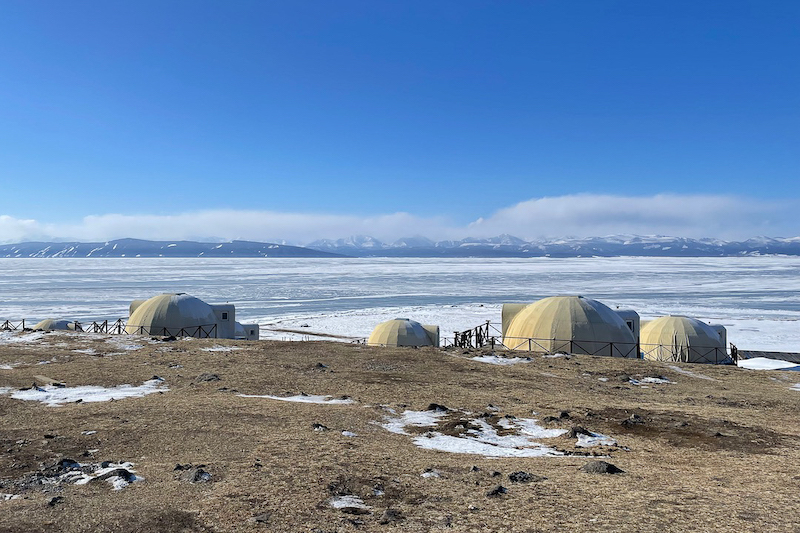
© On va marcher sur le lac
Conversely, were there any difficult moments and did you feel in danger?
During the first week, I was often projecting myself towards the finish, imagining the pleasure I'd have in returning to shore. Then that faded and gave way to a desire to take my time more than ever. Without being worried, we wondered about the possibility of encountering wolves, especially when on two occasions we found their tracks on the snow. The impressive sounds of the lake fascinated us more than they frightened us. As for getting through the ice, the probability was very low. At this time of year, the ice is over a metre thick in places.
If comfort is lacking, it seems to me that the essentials are there. This type of trip has brought my partner and me back to everything we need: to progress, to nourish ourselves, to live simply and unceasingly, to enjoy sharing this incredible immersion in one of the most beautiful environments I know. These three big weeks have taught us a lot, about the strength of our bond, and more than ever, about our aspiration to sobriety.
Thanks to Renaud's feedback, we're launching this winter expedition to Lake Khövsghöl for a departure in February 2024, which we're opening up to participants with even short experience of extreme cold and bivouacking.
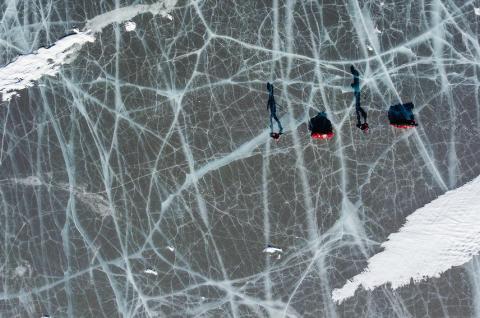
Winter expedition on Lake Khovsgol in Mongolia
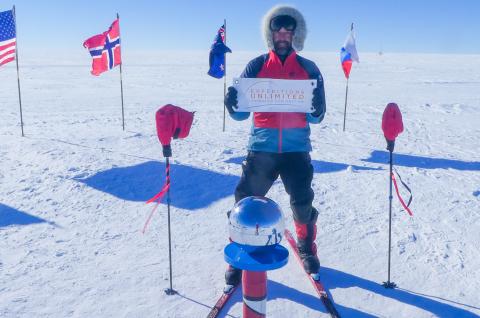
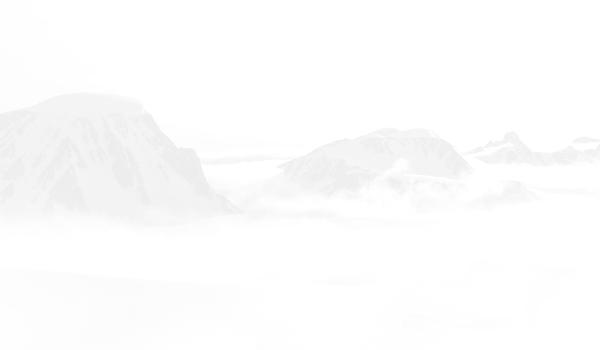
 Expeditions Unlimited blog
Expeditions Unlimited blog